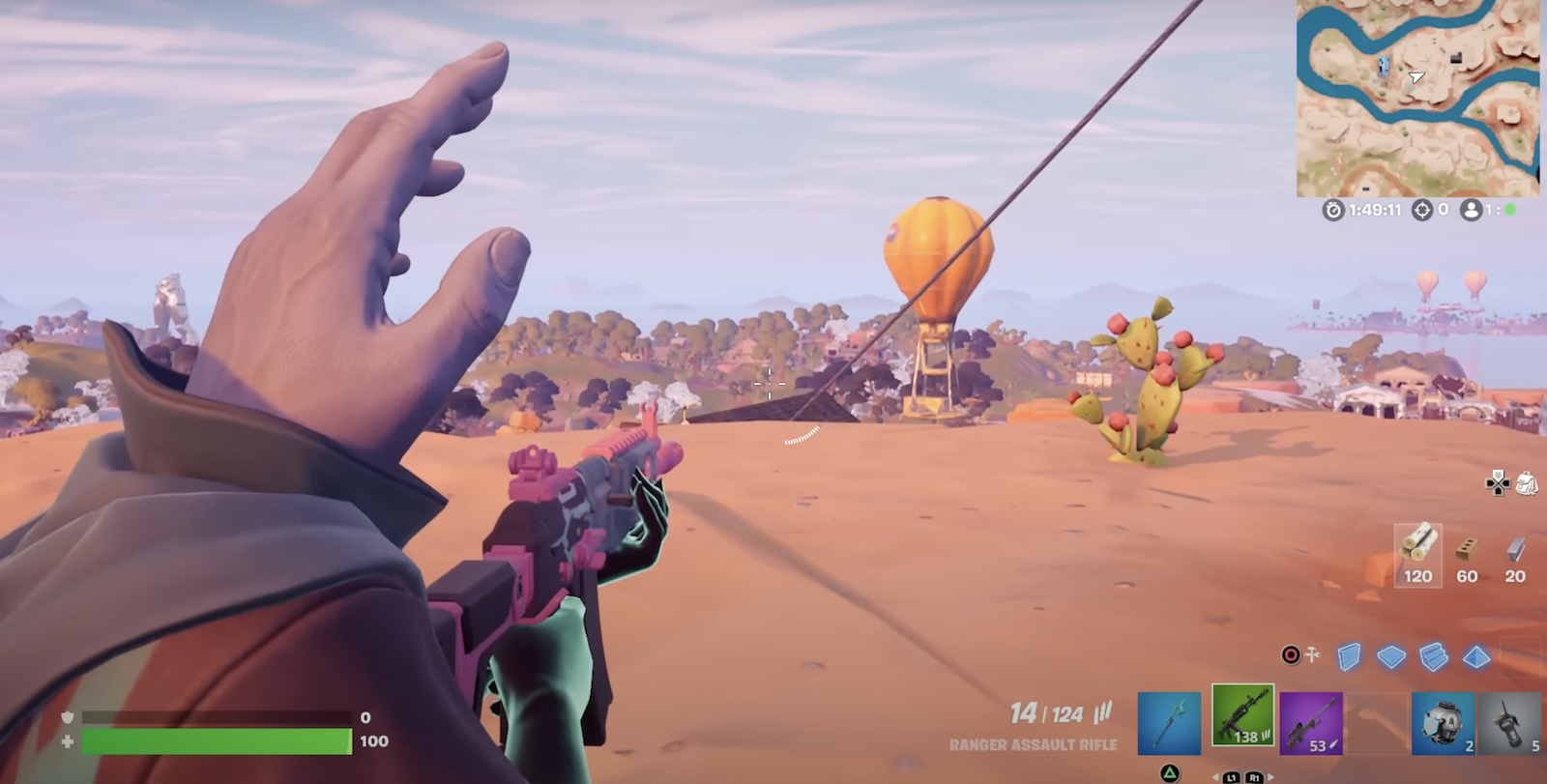Despite the fact that I almost always get shot immediately once I land there, and my girlfriend’s absolute disdain for it because of this, I’ve singled out Tilted Towers as my favorite spot. No matter where the circle forms, no matter which direction it pushes players, and really, no matter how many times I successfully engage two or three opponents only to get sniped by someone watching from dozens of meters away, I seem to end up here sooner or later. Tilted Towers is like walking around an abandoned film set depicting a city block. Some aspects of the faux-office buildings are made to scale while others are shrunken, as if a designer took a real-life object, like a fridge or a bed frame, and hit the minus button a few too many times. That, or everything looks just a touch too big—bunches of cabbage, coconuts, bullets, bottles of blue shield potion—all of these things floating just a few feet off the ground, haloed by green or purple or yellow light, while in the background, in structures that never have any windows or running water, you see other players scurrying along, collecting items, destroying walls, jumping up and down a few times to mount a rooftop before, as ever, they get merc’d by someone with a better position or a better weapon.
I started playing Fortnite recently, after watching the podcasting McElroy Brothers livestream the game on their YouTube channel for several weeks in a row. To my initial horror, it quickly became a facet of my daily life. I play as Sinister Glare, an original character with a large gray hand for a head and one single red eye. After having no real concept of what Fortnite was or how ubiquitous it’s been in the culture since 2017, I now understand why it’s the most popular video game ever. Shocking. Talking positively about massively popular things is a bit like, I don’t know, saying you love the internet. It doesn’t matter how you feel about it; it’s inescapable, everyone has to use it, you’re here, look around you. Playing any video game isn’t necessary for living life. I was just trying to be pithy. But Fortnite makes a grand case that you could spend your entire life playing it, if you wanted.
In the supremely general sense that it is cyclical and filled with strangers fighting for resources in a common space, rife with opportunities for someone to spend money on items that are valuable for their cultural significance as opposed to any skill-based advantage, and full of history-making lore that no one really pays attention to, Fortnite actually is like life. One of the first things that struck me, as someone who hasn’t played an online game in at least 10 years, is how absurdly overrun Fortnite is with franchise IP (Marvel, DC, Master Chief, Rick & Morty, Alien, Ariana Grande) and, to my delight, how utterly irreverent the game is to any and all of those dozens and dozens of coveted pop culture artifacts. By that I mean to say that watching a Xenomorph wield a machine gun and then teabag Ash from Evil Dead is not necessarily what I envisioned given the current worship of and bewildering demand for superhero movies and sequels and spinoffs. Maybe this is the logical endpoint to such a cultural landscape, the reduction of iconic images and characters to mundane avatars, a widespread acceptance that these things don’t matter all that much.
Mostly, I don’t care. What I’ve come to appreciate about Fortnite, what has fascinated me at least, is this: it is by no means impossible, or incorrect, to over-intellectualize one’s misgivings about the game, the Ready Player One qua Matrix qua Metaverse of it all, the mind-boggling scope of its reach around the world, the cynicism with which various media industries have glommed onto its unprecedented access to hundreds of millions of people, like remora sucking on a shark. I don’t dismiss those critiques. I think about them every time I see a shiny new skin and contemplate spending money I don’t have on something I won’t ever technically own. And yet, it is the first piece of mass media entertainment I’ve engaged with in a long time that doesn’t make me feel lobotomized after I use it. I leave out the higher fare. I’m talking about shit people log onto day in, day out, just to pass the time, all while being targeted mercilessly by rich idiots who want more of their attention. A large part of this is obviously the fact that Fortnite is engineered to be frictionless, to target the tiny part of your brain that goes, “This is fun!” It’s free, it’s colorful, you can’t buy your way to being good at it, none of it looks remotely like real life, and the weirder stuff, like musicians performing actual concerts, you can easily ignore. This works so well that all of the things I’ve just said seem like independently found discoveries when you first play, but really make up the common refrain one often hears about the game, even among its detractors. There's a slippery, appealing quality here no one can quite articulate without just describing how Fortnite works and why it’s worth your time, no harm done.
[2065. wearing the marine armor from Aliens 2 and on so many combat drugs I look like Palpatine. Yelling over railgun fire] They say after we take Quebec, we get to go home!
— evan forever (@turret_factory) November 4, 2022
[Young David Bowie clone they put in my unit as the sniper] This is my home brother
I can say that, during the bleakest parts of the pandemic, my relationship to diverting pastimes became skewed. Whatever. People have rehashed this to bits already, the sitting around, the sense of watching the world watch itself, the lack of connection, etc. What’s stayed with me is a curiosity about how we might all live our lives online, not because it’s good or bad, but because that’s where I keep being told things are heading. Fortnite is a taste of what that life could look like, of what it already is. Five years following its release by one of the largest video game corporations (after aping the much-beloved but much smaller battle royale format from PlayerUnknown’s Battlegrounds), and all the think-pieces written by middle-aged white dads who scoffed at the downward spiral of younger generations, Fortnite has settled into a steady, ambivalent rhythm. It is excellent at being what it is, a game bursting with so many ridiculous details, dances and booted cars and wolves you can kill for meat, while generally being just fine at trying to steal other popular game mechanics. There isn't a drop of blood to be found, and the game is working overtime to convince you that it is endearing, harmless, a laugh.
The other night, I was playing during “Skywalker Week,” when the game made special items like lightsabers and blasters available, along with a host of Star Wars skins. My girlfriend was hunched next to me on the couch, playing Fortnite on our Switch. Through my repeated pestering, I got her, our neighbors, and a couple of coworkers to start playing for the first time or, in some cases, to pick it back up again. I kept thinking about how often I’d heard the fear-mongering about video games growing up, what they’d do to my attention span, how they encouraged a disconnect from reality, an entire generation lost to the couch and a screen, unable to socialize or communicate their innermost feelings. I kept trying to examine my relationship to these negative ideas, whether or not I had internalized any of them, whether or not they were true, if only in a more diffuse, less straightforward way. I thought about staying up late with my GameCube and then my PS2 and then a shitty laptop, whiling time away, a feature of any childhood. Absurdly, I thought about whether I was a better or worse person because of all of this.
I came up dry. Yes and no. This kind of navel-gazing isn’t necessarily without utility, but also, sometimes you can have a little fun. The truth about video games is the truth about most mass media: They are products of rampant capitalism and the thankless labor of thousands of artists and developers, beloved by ardent fans, despised by stubborn doomsayers, the subject of unhealthy obsession and scholarly investigation, cultural objects made idiosyncratically unique no matter their humble or sweeping origins. It seems pointless to try to scry into possible futures in order to figure out what games like Fortnite or Second Life or Counter Strike or League of Legends portend for society. Inflection points are happening all the time. And, as I keep stressing, these things are already here. Their legitimacy isn’t granted by their prestige or artfulness or whatever, though those aspects do exist, but by the fact that they are where people choose to be. All of this will sound obvious, or stupid, to the more experienced crowd. It’s more that, rather than a narrow, simple insularity, Fortnite grants me a wide, complicated, sometimes palpably social view outward, and that’s something I didn’t expect. It’s not really like life, but at this point it's a bizarre, hilarious piece of mine, as dumb and as nuanced as getting shot in the head by a random 13 year-old halfway around the world.






